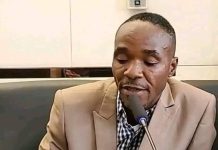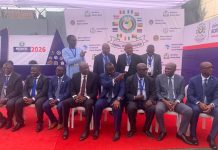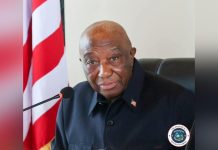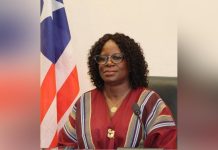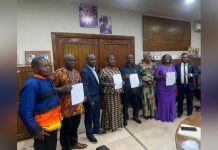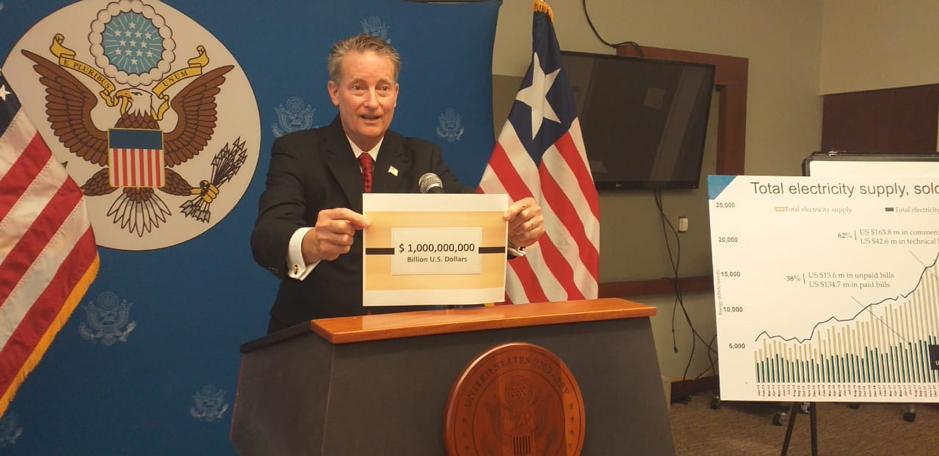
Africa-Press – Liberia. Monrovia –
United States Ambassador to Liberia, Michael McCarthy has warned Liberians and the Government that America and some of Liberia’s major partners may withdraw their support to the energy sector if they fail to stop the widespread power theft that is crippling the sector.
Ambassador McCarthy made the comments in his first news conference on Thursday, following a tour of the Liberia Electricity Corporation’s (LEC) Bushrod Island facilities.
“… If we are taking all this money from taxpayers and the result is that people of Liberia are living for free, eventually, our Congress will say, we are not going to appropriate any more money to that project. And I think all of the donor countries feel the same way, I will assume,” he said, when asked about the consequence of the menace.
The United States, through the Millennium Challenge Corporation Compact, spent $257 million over the period of five years. The fund primarily focused on rehabilitation of the Mt. Coffee Hydropower Plant, the largest source of power in the country and Liberia’s most valuable fixed asset. The compact, which ended in January this year, in addition to the resuscitating the hydro, supported the creation of an independent energy sector regulator, and developed a training program for technicians in the electricity sector, among others.
With the end of the compact, it has been the anticipation of the United States government that Liberia will build on the progress achieved, expand the economy and improve the lives of Liberians.
However, some of those prospects are not being realized due to increasing power theft. During his visit, the Ambassador learned officials that commercial losses (theft and unpaid bills) account for over 50 percent of the electricity produced by LEC, seriously threatening the financial viability of the organization.
At the press conference held at the U.S. Embassy, he expressed mixed views, saying, “I was both impressed and discouraged by what I saw and heard.” The LEC’s international management team has greatly improved LEC’s operational readiness and facilities. Even so, widespread power theft and unpaid power bills have placed LEC in a financial crisis from which it cannot recover without immediate intervention and support from the Liberian Government.”
Touching on several issues, he said electricity generation, transmission, and distribution is very expensive; and while utilities around the world invest large sums in infrastructure, operations, and maintenance in order to ‘keep the lights on’, they receive very low return on investment.
“Liberia’s power sector is no different, except that it is losing money every day,” he said. “Nowhere in the world is electricity free. I pay an electric bill at my home in the United States. As Minister Tweah said last week, Liberia is no different: if you want electricity, you must pay for it. Nobody has ever promised free electricity to the people of Liberia.”
He pointed out that more than half of all electricity LEC generates is not paid for and each connection that isn’t generating revenue is a step toward the collapse of the electric grid.”
Giving further statistics, he noted that about two-thirds of the electricity being generated by LEC does not result in revenue [due mostly to power theft].
“Without that revenue, how can LEC fix the technical issues? How can they quickly respond to power interruptions? How can they continue to connect more of Liberia to the power grid?” he asked.
The Ambassador then acknowledged that electricity is expensive in Liberia, but it will be difficult for that to change because for each person that illegally connects to a power line, they are making everyone else underwrite the cost of power and making it harder to reduce the cost for those who do pay.
In addition, he said they are also making all connections less reliable, which will lead to even more maintenance costs down the road. The only way to reduce the cost of electricity is for every LEC customer to be properly connected and to pay their electricity bills.”
A Call to Action
He blamed both the private and public sectors for the shortcomings in the sector and outlined called for a collective fight to end it.
“I call on every user of electricity in Liberia to pay their bills in order for the power sector to survive here,” he urged.
Referencing the LEC mid-year report, the Ambassador named the first culprit as those businesses in Liberia who are illegally hooking up their power; adding that businesses use the most electricity, and those who are not properly paying LEC for the power used, are risking the complete loss of current and the possibility that their own business will shut down.
The second culprit, he noted, are people who get illegal connection for their homes. “If you are not using a connection with a meter that is legally installed by an LEC employee, then you are partly to blame for this situation. And you lose your right to complain when your power goes out and you can’t run your fan or charge your phone.
He continued: “The third problem area—and it pains me to say this—is the Government of Liberia. The Government of Liberia is the largest customer of LEC electricity, and it is often behind on payments. In addition, there have been zero—as in not a single one—convictions of businesses and individuals for power theft. Considering the widespread nature of the issue, how can this be?”
The Government of Liberia, in an effort to discourage power theft, passed into law, the Power Theft Act in 2019. The ACT was submitted by the Executive Branch through the office of the President in the wake of increasing theft of electricity through illegal connections, tempering with meters, transmission and distribution lines, as well as theft of assets including light poles, wires and transformers.
The Act recognizes and treat power theft as a national security threat, defines adequately the various conduct that constitute Power Theft, and prescribe penalties which are proportionate to the seriousness of the offence. But two years after its enactment, the government has not prosecuted anybody, despite the proliferation of the menace.
Ambassador McCarthy, stated that it is not enough to say that the power theft situation is complicated, or that it’s hard to fix. He said: “In order to protect our investments, and your future, and to set Liberia on the path to opportunity, we need to see action—payment of electricity bills, prosecutions, convictions—and we need to see substantial sentences and fines for power theft. This needs to be a systemic focus—nothing will improve without a strong response across the judicial system, supported at the highest levels of the Liberian Government”.
He continued: “I ask the Liberian Government and the people to take power theft more seriously. Having invested so heavily in the power sector here, it’s not too much for the U.S. Government to ask that the Liberian Government do more to protect our investments and its own power sector.”
He revealed that that the Embassy has been told by multiple sources that there is a well-organized electricity theft cartel that benefits well-connected businesses and even government officials.
He also added that that the U.S. diplomatic mission was aware that some LEC investigators trying to fix this problem have been harassed by some representing themselves as security officials.
“This is absolutely unacceptable. As major investors in Liberia’s power sector, we call on government officials to do everything possible to stop this corruption and prosecute the perpetrators, no matter how important they may be,” he urged.
The LEC, he revealed, has lost $220 million dollars in the last five years alone to technical and commercial losses and unpaid bills, adding, that the money could have been spent increasing the grid to provide electricity access for all.
Theft Against Pro-Poor Agenda
Speaking further, the Ambassador bluntly said that those who steal from the LEC are not robbing a deep pocket corporation, they are stealing from the Pro-Poor Agenda. He said the United States was concerned because it cares about the development of Liberia and its people; and corruption and power theft are standing in the way of that development.
“The U.S. has spent more than a billion—that’s a billion with a ‘B’—on Liberia’s energy sector in the last decade. That is American taxpayer money. Every American you see in Minnesota, in Georgia, in Texas, that is their hard-earned money being invested in your development. How can we continue to justify that generosity when more than half of the power generated by that system is permitted to be stolen with no consequences?” he asked, while displaying a paper with a caption of a billion written in number and words.

